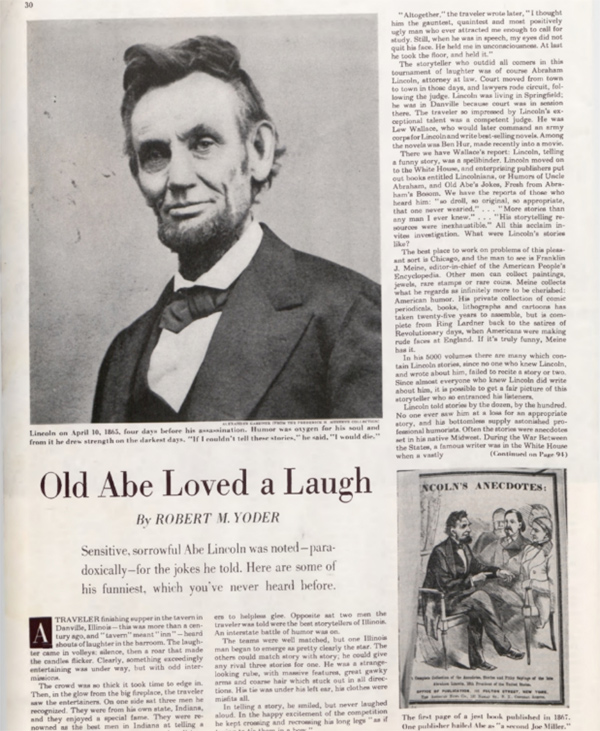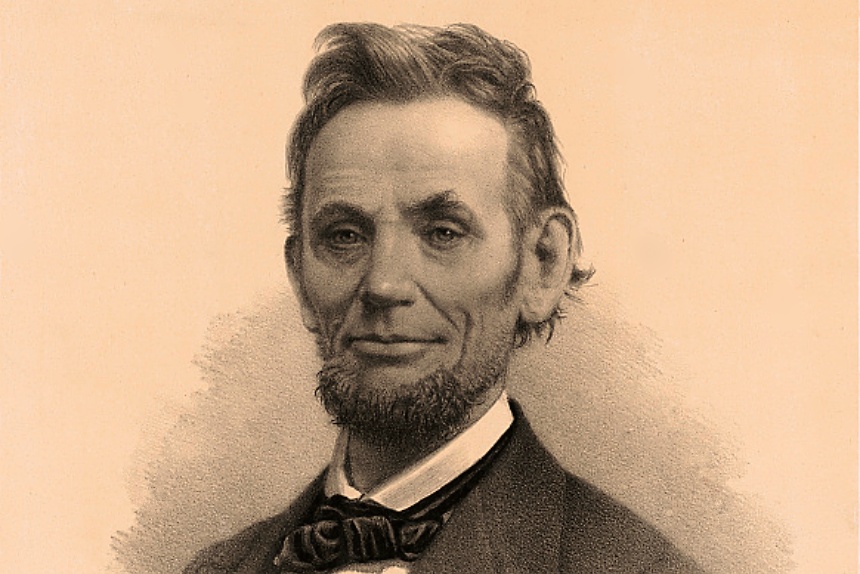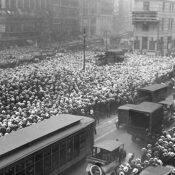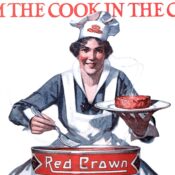Imagine the unknown Lincoln. Picture the frontier lawyer who stepped onto the national stage — unkempt, gawky, blunt, speaking with a prairie twang in a high voice. And homely. Lord, he was homely.
Lincoln’s contemporaries, seeing him for the first time, might have noticed the same two things that struck Lew Wallace when he first saw Lincoln.
Later in life, Wallace was a best-selling author, a celebrated Union general, and a territorial governor. But in 1851, he was just another attorney who rode the judicial circuit with other lawyers. One evening, just after sundown, he rode into Danville, Illinois, and entered the local tavern. He found it crowded with people attending court business. As he edged his way into the crowd, he heard occasional bursts of laughter over the noise of the bar. Working his way toward the sound, he found that two teams of lawyers from Indiana and Illinois were have a joke-telling contest.
He took particular note of one of the contestants representing Illinois.
He arrested my attention early, partly by his stories, partly by his appearance. Out of the mist of years he comes to me now exactly as he appeared then. His hair was thick, coarse, and defiant; it stood out in every direction. His features were massive, nose long, eyebrows protrusive, mouth large, cheeks hollow, eyes gray and always responsive to the humor. He smiled all the time, but never once did he laugh outright. His hands were large, his arms slender and disproportionately long. His legs were a wonder, particularly when he was in narration; he kept crossing and uncrossing them; sometime it actually seemed he was trying to tie them into a bow-knot. His dress was more than plain; no part of it fit him… Altogether I thought him the gauntest, quaintest, and most positively ugly man.
What was even more memorable to Wallace was Lincoln’s ability to hold a room’s attention — and his apparently bottomless fund of jokes.
About midnight, his competitors were disposed to give in; either their stores were exhausted, or they were tacitly conceding him the crown. From answering them story for story, he gave two or three to their one. At last he took the floor and held it… Such was Abraham Lincoln. And to be perfectly candid, had one stood at my elbow that night in the old tavern and whispered: “Look at him closely. He will one day be president and the savior of his country,” I had laughed at the idea but a little less heartily than I laughed at the man. Afterwards I came to know him better, and then I did not laugh.
Humor was an essential part of Lincoln, and a critical element in his success. As a Congressional candidate, he used it to fire up crowds and put down hecklers. Running for the senate, his humor enabled him to score points off the well known and skilled politician, Stephen Douglas. When, for example, Douglas told a debate crowd that Lincoln was unqualified and unskilled, he added that Lincoln had once run a general store, selling cigars and whiskey. He added, “Mr. Lincoln was a very good bartender.” Lincoln retorted, “Many a time have I stood on one side of the counter… and sold Mr. Douglas whiskey on the other side.”
When Douglas accused Lincoln of being “two faced,” Lincoln shot back, “If I really had two faces, do you think I’d hide behind this one?”
Humor also proved valuable to Lincoln as president. As Robert M. Yoder noted in a 1954 Post article,
If a time-wasting friend lingered too long, Lincoln could disengage himself by telling a story which ended the conversation. He answered questions with stories; he avoided answering by telling stories. If the conversation headed in directions he didn’t like, he could change the subject with a story.
And, as we know now, humor helped Lincoln maintain his sanity.
“If I couldn’t tell these stories,” Lincoln once told a congressman — and gravely—”I would die.” Humor was of tremendous importance to this sensitive and sorrowful man; almost a sort of oxygen for the soul. It offended a good many citizens that Lincoln could joke in times so tragic, but those close to Lincoln understood the emotional process involved. It was jesting-that-I-may-not-weep.
Yoder offered several examples of Lincoln’s jokes. Some are familiar, but the number of unfamiliar stories suggests that Lincoln knew far more jokes than have been recorded.
When a courier appeared at the War Office to announce a major Union victory, the officers were surprised that Lincoln showed no excitement. Lincoln dismissed the courier and cheerfully told the men in the room,
Pay no attention to him… He’s the biggest liar in Washington. He reminds me of an old fisherman I used to know who got such a reputation for stretching the truth that he bought a pair of scales and insisted on weighing every fish in the presence of witnesses. One day a baby was born next door and the doctor borrowed the fisherman’s scales. The baby weighed forty-seven pounds.
Once when he found all his advisers solidly against him, he told this story:
A drunk wandered into a revival meeting and, after mumbling, “Amen,” a few times, fell asleep. As the meeting closed, the preacher cried, “Who are on the Lord’s side?” The congregation stood as one — all except the slumbering drunk. That shout didn’t wake him, but the next one did. “Who are on the devil’s side?” the revivalist cried. That roused the sleeper. Seeing the preacher standing, the drunk rose too. “I didn’t exactly understand the question,” he said warmly, “but I’m with you, parson, to the end.” He looked around at the silent crowd, all seated. “But it seems to me,” said the drunk, “that we’re in a hopeless minority.”
Lincoln’s easy use of humor changed America’s taste in politicians. Previously, Americans had preferred solemn, humorless men with the gravity of Old Testament prophets. We now expect our legislators and presidents to occasionally tell, and laugh at, jokes. We believe a sense of humor reflects a sense of reason and proportion, and an ability to perceive the outrageous.
In many regards, Lincoln was a man ahead of his times. He saw, sooner than most of his contemporaries, what we all recognize: laughter is necessary for keeping our sanity.

Featured image: Library of Congress
Become a Saturday Evening Post member and enjoy unlimited access. Subscribe now




Comments
enjoy reading the Saturday Evening Post. The timeless stories are amazing and filled with God’s grace to the people who share them.
God bless America…Amen.
Keep up the good work…kudos.
Mr. Walker
Madison, WI
One can not read something about a president who is believe to be one of the greatest if not the greatest in the history of this nation without some IDIOT bringing today’s politics into the discussion. This is not the place for Bob Taylor to air his personal grievances about a president he does not like. His comments in this place is inappropriate and shows a lack of common courtesy. There is an old saying that would fit his interjection which goes “It is better to be thought a fool than to make an inappropriate comment and remove all doubt”. People like to read for pleasure and enjoy an article about Lincoln and not your diatribe about Trump.
And have we ever had a more utterly humorless president than the incumbent? A capacity for humor requires a sense of proportion about oneself. Even Jimmy Carter could make a joke now and then; I can’t recall any of Nixon’s, but the poor man was such a social maladept, he can probably be excused.
The incumbent is hilarious unwittingly: the Mussolini like uplifted face and jutting jaw serve well to show the man’s grotesque obnoxiousness and fundamental disregard for anyone who isn’t himself, yet we know that his idiocy is so deep he needed his then Chief of Staff, John Kelly, to explain to him what the Arizona memorial at Pearl Harbor is all about.
And no, shouting and tweeting insults constantly like the brat he is doesn’t equate with a sense of humor.
Laughter is necessary in keeping our sanity! I liked the way Lincoln “got back” at Stephen Douglas regarding his drinking and (Lincoln) being two-faced. The way he took control and changed the directions of conversations going off-course was skillful and brilliant.
I had a subscription to the Post, has it run out? If so, I definitely want to renew.
I am a member receive Saturday evening post